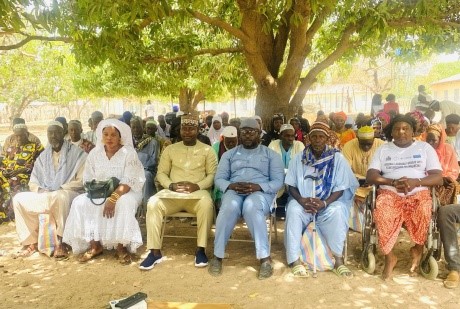By Mariama Marong
As the 2024 Draft Constitution has passed the first reading in parliament and is now heading to its second reading, members of the National Council for Civic Education (NCCE) have started engaging communities across the country, in consultative meetings with NAMs and their constituents.
With funding from the UNPD, the NCCE started the dialogue in URR, where three meetings were held in different constituencies.
Meetings in the URR commenced on the 17th May, 2025 in Basse, Sare Alpha and Yorobowal village.
In one of their meetings held in Tumana Constituency, Mamadou A.H. Bah, senior program officer who spoke on behalf of NCCE director, explained that role of Civic Education is to enlighten people on the constitution and its importance and said the theme for their dialogue is on: ‘‘A New Constitution For a New Republic: Get Informed, Get Involved.”
Mr. Bah highlighted the importance of a new constitution saying this is fundamental and will enhance the country’s democracy and governance structure. He said people need to know the provisions in the 2024 Draft constitution before it becomes law; that these include the sovereignty of the country, national values, citizenship, fundamental human rights and freedoms and inclusive participation (women, youth and all persons with disabilities).
In his contribution, Hon. Nfally M. Kora, the Member for Tumana Constituency, said it is the responsibility of all Gambians to ensure that they apprehend what the 2024 Draft Constitution entails.
Hon. Kora said laws are very necessary and essential for a democratic society.
“If we want to enjoy our democracy, we need to embrace this Draft Constitution and engage the people about its cruciality,” he said, adding that the dialogue allows the people to express their opinions on the Draft Constitution.
He said as National Assembly Members, they will ensure that people’s voices are respected in the governance process of the country. Hon. Kora said citizens have the rights to hold their leaders and government to account.
In Kantora District, Hon. Bilay G. Tunkara, the National Assembly Member for the area and Majority Leader at the Gambian parliament, commended the NCCE for organising the meeting and to interface with their constituents to discuss the 2024 Draft Constitution, which is nearly ready for a second reading in parliament.
Hon. Tunkara said governance is a social contract that exists between a government and the people, adding that there is a need to have a new constitution that is in line with modern laws and society.
“Things are evolving including laws, to address the needs of society,” he said, and said people should take ownership of the 2024 Draft Constitution.
Aji Fatou Sallah, a participant from Madina Bamako, argued that they should be engaged in consultative dialogue with NAMs as often as possible.
“Well, without the NCCE’s intervention, we in rural communities will find it difficult to engage our leaders. It is their responsibility as our representatives in Parliament to ensure that we are aware of matters, most importantly, the country’s Draft Constitution,” She said, noting that the one-day interface will not be sufficient for them to understand the entire Draft.
“We need more engagement for a better understanding of the Draft Constitution because this is not only about us, but it is about the future of our children, and this should always be part of the process,” Ms. Sallah said.
She urged lawmakers to critically examine 2the 024 Draft Constitution for the interest of Gambia.
“ Yes, in as much as we want a new constitution, we as citizens call on NAMs to consider the interest of the people in this matter, rather than their individual interests,” she said.
Mamadou Trawally from Kantora also called Parliament to make laws that will be of interest to the entire nation. Kaddy Sanneh, the lady councilor of the area, also commended the NCCE for what she called their tremendous effort in ensuring that their voices are heard and included in the 2024 Draft Constitution, and said the new draft constitution should address the challenges of women’s representation in parliament.
“We want to see more women in parliament, because we need equal representation of all,” she said.


















